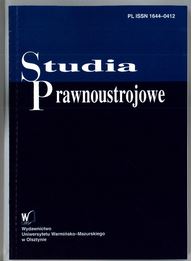The phenomenon of human organ trafficking in light of the United Nations sustainable development agenda with special emphasis on cultural offences in Republic of Kosovo
The phenomenon of human organ trafficking in light of the United Nations sustainable development agenda with special emphasis on cultural offences in the Republic of Kosovo
Author(s): Magdalena Ickiewicz-SawickaSubject(s): Criminal Law, Human Rights and Humanitarian Law, Criminology, Studies in violence and power
Published by: Wydawnictwo Uniwersytetu Warmińsko-Mazurskiego w Olsztynie
Keywords: law; criminology; sustainable development; win-win; cultural offences; human and organ trafficking; war crimes; rotten trade; transnational crime; Republic of Kosovo;
Summary/Abstract: The article concerns the issues related to the illegal trade in human tools in the light of the theoretical structure of sustainable development created by the United Nations (UN). The text consists of several parts. The work aims to show the following research areas: – axiological and legal assumptions of sustainable development in the context of a triple win: social, economic and environmental, – the criminological profile and picture of organized crime in the Republic of Kosovo – trafficking in human organs in the territory of the Republic of Kosovo, – information on traditional customary law (Kanun) in Albanian culture – analysis of the phenomenon of harvesting human organs in Kosovo. The last part of the article presents the economic, social and criminological problems of Kosovo in the context of the Sustainable Development Agenda. The analysis contained in the text proves that the youngest European country (2008) struggles with many problems of a legal, economic and social nature. These problems are not only a consequence of the recent post-Slavic armed conflicts but also result from the specific Albanian legal culture (Kanun rules), which still affects the functioning of this society (especially in the provinces). Therefore, these customs still determine the level of crime in this country, both common and related to the activities of organized crime groups (with particular emphasis on trafficking in human organs). Therefore, it is recommended to successively implement the legal solutions contained in the Agenda for Sustainable Development, to stabilize not only this country but the entire region.
Journal: Studia Prawnoustrojowe
- Issue Year: 2021
- Issue No: 54
- Page Range: 119-134
- Page Count: 16
- Language: English

